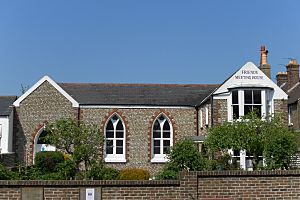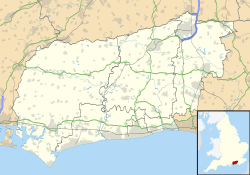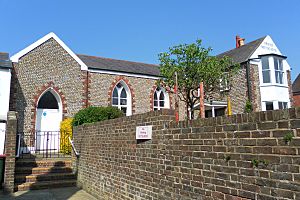Littlehampton Friends Meeting House facts for kids
Quick facts for kids Littlehampton Friends Meeting House |
|
|---|---|

The meeting house from the south
|
|
| 50°48′35″N 0°32′20″W / 50.8097°N 0.5390°W | |
| Location | 23 Church Street, Littlehampton, West Sussex BN17 5EL |
| Country | England |
| Denomination | Quaker |
| Website | www.littlehamptonquakers.org.uk/ |
| History | |
| Status | Meeting house |
| Founded | 1835 (as Penny School); 1965 (as Quaker meeting house) |
| Architecture | |
| Functional status | Active |
| Heritage designation | Grade II |
| Designated | 21 August 1975 |
| Completed | 1836 |
The Littlehampton Friends Meeting House is a special place where Quakers, also known as the Religious Society of Friends, gather for worship. It is located in the town of Littlehampton in West Sussex, England. This building has an interesting history. It started as a school in the 1800s before becoming a Quaker meeting house in the 1960s.
Quakers have been meeting in Littlehampton since the 1960s. They bought this old school building, which was built in the early 19th century. The building has an L-shape and is covered in flint stone. It used to have schoolrooms and a house for the schoolmaster. Now, it is a place where Quakers hold their weekly meetings. The building is also recognized as a Grade II Listed building, meaning it is an important historical structure.
Contents
A Look at the Past: How it Began
Littlehampton is a town by the sea, where the River Arun meets the English Channel. In the 1800s, it grew into a small port and a popular seaside resort. By 1861, about 2,436 people lived there. People could find "pleasant lodgings" near the beach. Ferries helped people cross the river.
Early Education in Littlehampton
In the early days, private teachers offered schooling in Littlehampton. In 1835, a woman named Mrs. Welch started a "Penny School" on Church Street. This was a type of school where children paid a small fee, like a penny. The school building was L-shaped. It had one schoolroom and a house for the schoolmaster. Around 65 students usually attended this school. It was opened in 1836. This school was run by Dissenters, who were religious groups separate from the main Church of England.
From School to Meeting House
After some time, the Penny School was no longer used for education. It then became a religious building for the first time. A group called the Plymouth Brethren used it for their meetings.
Meanwhile, Quakers began meeting in Littlehampton in 1952. They wanted a permanent place to worship. So, in 1965, they bought the former school building. By this time, the Plymouth Brethren had moved to another hall in town.
In 1985, the Littlehampton Friends Meeting had 20 members. Today, the Religious Society of Friends describes it as a "large" meeting. Weekly meetings are held every Sunday morning.
The Littlehampton Friends Meeting House was officially named a Grade II Listed building on August 21, 1975. This means it is a building of special historical or architectural interest.
Building Design and Features
The building that used to be a school has an L-shape. It has a long part facing south and another part sticking out to the east. The outside walls are made of flint stones. They have red bricks around the edges and grey bricks at the corners, called quoins.
The main part of the building has three sections. It features two windows with pointed arches. Each window has two tall, narrow lancet windows inside. There is also a similar arched entrance on the left side, which sticks out slightly.
The east part of the building has a bay window that goes from the ground to the roof. This window faces south. Above it, there is a gable (the triangular part of a wall under a sloping roof) covered in stucco. On this gable, you can see the words "FRIENDS' MEETING HOUSE" painted. This two-story section was originally where the schoolmaster lived.
Nearby Historic Buildings
The Littlehampton Friends Meeting House is part of a group of important buildings on Church Street. English Heritage, a group that protects historic places, recognizes its value with the nearby buildings at 7, 9, 11, 13, and 15 Church Street. This means the outside of the meeting house adds to the historical look of the whole group of buildings.
Numbers 11, 13, and 15 are a row of cottages. Two of these cottages were built in the 1700s but got new fronts in the 1830s. The third cottage was built around the same time. Numbers 7 and 9 were once a single farmhouse from the year 1700. They also have flint and red-brick fronts.
See also
 | Jewel Prestage |
 | Ella Baker |
 | Fannie Lou Hamer |



